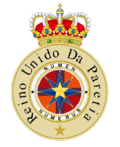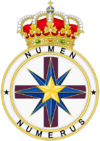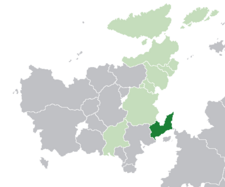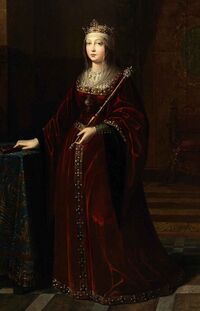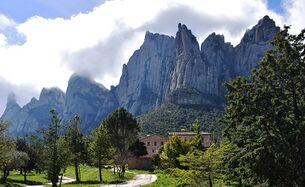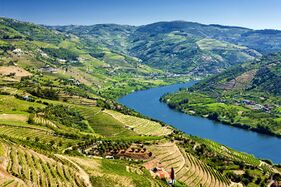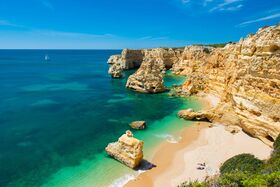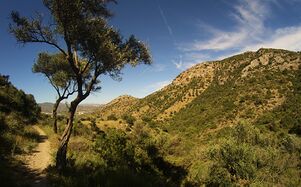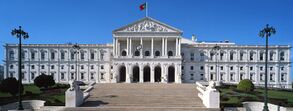Paretia
United Kingdom of Paretia Reino Unido Da Paretia (Luzelese) Reino Unido De Paretia (Esmeiran) | |
|---|---|
Motto: Força na Fraternidade! "Strength in Brotherhood!"
"" | |
Anthem: Marchamos Juntos! | |
Paretia's location on Kylaris | |
Paretia in Euclea(Green) and the Euclean Community(Light Green). | |
| Capital and Largest City | |
| Official languages | Luzelese Tosutonian |
| Demonym(s) | Paretian |
| Government | Federal Parliamentary Constitutional Monarchy |
• King | Erasmo |
• Premier | Isilda Cintura |
| Legislature | Assembleia Nacional |
| Câmara do Senado | |
| Câmara do Congresso | |
| Establishment | |
| 1541 | |
| Area | |
• Total | 240,886 km2 (93,007 sq mi) |
• Water (%) | 7.02 |
| Population | |
• 2016 census | |
| GDP (PPP) | 2020 estimate |
• Total | |
• Per capita | $26,345.11 |
| GDP (nominal) | 2020 estimate |
• Total | |
• Per capita | $23,715.79 |
| Gini (2020) | 36.9 medium |
| HDI (2020) | 0.791 high |
| Currency | Euclo (EUC (€)) |
| Date format | dd.mm.yyyy |
| Driving side | right |
| Calling code | +109 |
| Internet TLD | .pa |
Paretia (Luzelese: Paretia), officially the United Kingdom of Paretia (Luzelese: Reino Unido Da Paretia; Esmeiran: Reino Unido De Paretia; Vecisan: Reino Unido De Paretia; Tosutonian: Regne Unit d'Paretya), is a Federal Parliamentary Constitutional Monarchy situated in eastern Euclea, located on the Paretian Peninsula. It is shares land borders with two nations, the northwest by Gaullica, and to the southwest by Etruria. It also shares maritime borders with three other nations, to the east by Montecara and Tsabara, and to the southeast by Emessa. Paretia has a population of 31.2 Million people. The Country is a union of four kingdoms, Esmeira, Tosutonia, and Vicisa and Luzela, the latter being the largest and most powerful kingdom of the four. Each of these kingdoms speak a separate language and have different, but still closely intertwined cultures.
The location of Paretia on the western side of Aurean Straits has made it a place of significance throughout much of human history. For much of it's earliest history, the peninsula was inhabited by Tenic cultures, the largest was known as the Eastrian culture. By the 7th century BC, the Piraeans had begun to set up colonial cities across the peninsula. These cities would eventually grow due to the trade that was constantly going through the region. Soon the Solarian Empire would conquer the peninsula, and the empire saw Paretia with high importance and began to invest heavily into the region. Cities were founded by the empire, the largest being Preceus, which today is the capitol, Precea. After the fall of the Empire, it's successor the Verliquoian Empire would take over the peninsula. During this era the Tagamic Invasions from Coius would land on the peninsula and Paretia became the focal point of the conflicts. These hordes would sack and destroy many cities in the peninsula. Eventually the horde was defeated by the Verliquoian hold on the peninsula was severely weakened. Various kingdoms and principalities would form across the peninsula, these kingdoms each had different unique languages such as Luzelese, Esmeiran, Tosutonian, and Vecisan. The most notable of these kingdoms was Luzela, located on the eastern half of the peninsula.
By the 1400's Luzela had made itself far richer and more powerful than it's neighbors. In the early 16th century, the Queen of Luzela Marta I, would lead her armies to conquer the peninsula and install puppet kingdoms ruled by the same royal house as Luzela, House Azulas. Martia I would proclaim a United Paretian Empire or the United Kingdom of Paretia. The various Kingdoms would begin to colonize in Asteria Superior and Asteria Inferior, these colonies would be ruled by the separate kingdoms and had different official languages. In 1688 King Marcellus II would establish create the first Assembleia Nacional. In the 18th century many all of the colonies would gain independence. In 1833, King Xavier IV would join a movement to create a constitution for the nation.
In 1913, the Great Collapse would destroy the economy and the government was extremely unpopular, political leader Xulio Sousa would be elected Premier and began to implement popualar liberal policies to help the economy, however the pro-entente pro-functionalist monarchy ruled by Ana II would allow and support a takeover by the fascist Solarists led by Carlito Palmyro. Sousa would be sent to exile to Etruria and begin a separate government, supporters of Sousa would begin rebellions and resistance in Paretia. The Great War began with the Solarists allying with Gaullica. Eventually the Grand Alliance and the pro-Sousa rebels would defeat the Entente and the United Paretian Republic would be founded by Sousa, however he would die of age shortly after and his successors would be unable to rebuild the country. The Etrurian Revolutionary Republic would conquer Paretia in the Solarian War. The CN would eventually liberate the country. The instability and separatism after this war would lead to a coup by pro-monarchists in 1946. The monarchy and the United Kingdom was restored by this.
Paretia would join the Euclean Community alongside Amathia in 1995. Today the country is ruled by King Erasmo and the government is lead by Isilda Cintura, who is the head of a moderate to center-right coalition in the Assembleia Nacional. Paretia is currently member of the CN, the EC, the Aurean Forum, and the Association of Solarian Nations.
Etymology
The word "Paretia" comes from the word Parietem, the Solarian word for "Wall". The Solarians named the peninsula when they conquered it. The name derives from the original Piraean name for the peninsula, Empodio, which meant wall in Piraean. The name comes from the idea that the peninsula was a wall that divided the northern oceans to the southern oceans of Euclea. Most Solarian documents and maps labelled the peninsula as either Parietia or Parietium. Other names for the region include West Aurea and Great Luzela.
History
Prehistory
Antiquity
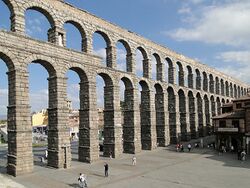
Middle Ages
Renaissance and Unification
Early Modern
19th Century Paretia

Great War


Republic Period
Solarian War
Restoration of the monarch
Late 20th Century
21th Century Paretia
Geography
Paretia is approximitly 240,886 km2 in size. It is located on the promenant Paretian Peninsula which extends from eastern Euclea. The country is located between the Florian and Lumine Oceans at the Aurean Straights, which separate the country narrowly from Tsabara and the Coius continent.
The Paretia coastline is rough and jagged in most places with rocky shores cliffs spanning it's beaches. The inland regions are separated by towering mountains known as known as the Eastern Aventine Range and rolling hills in around the mountains. The nation's highest peak is Mount Avìle on the western border with Etruria, it reaches as high as 3,057 meters (10,032 ft). The longest river is the River Espiesa which flows from the northern border of Esmeira and Tosutonia and flows to it's mouth at Teradad at the southern end of the country. The flat region in Esmeira is known as the Deguita Plain.
Much of the flatlines of the country are full of rolling hills with various crops and other agricultural fields located across them. Many valleys are located in the inland of the nations as well hidden between the mountains. Much of the country is covered in a golden like soil that is known for it's tilth. The northern tip of the Paretian Peninsula is at a point known as Ponto Brilho, the eastern end of the peninsula next to Montecara is known as Ponto Continental.
The Les Fulles Mountains, Tosutonia
The Viña River Valley, Esmeira
The Costa Do Ulisto, Luzela
Mount Avìle, Esmeira
The arid Zarcuros Hills, Luzela
Climate
Flora
Fauna
Government and Politics
The government of Paretia is a Federal Parliamentary Constitutional Monarchy in which the Monarch is the Head of State and appoints a Premier to be the Head of government. The Constitution of The United Kingdom of Paretia, adopted by the country in 1833, is the document that sets up the rules, regulations, and framework of the government. The current Monarch of Paretia is King Erasmo, who has ruled since he was given the throne in 1980. The current heir apparent of the monarchy is his daughter, Princess Miriam.
Government
King of Paretia
Premier of Paretia
The Legislature of Paretia is a set up in a bicameral system and is known as the Assembleia Nacional. There are two legislative chambers, the lower chamber is known as the Câmara do Congresso, and the upper chamber is known as the Câmara do Senado. The last chamber is the Coroa, which is where the monarch presides. In order for a bill to be made into law, it needs to pass a vote in both the Câmara do Senado and Câmara do Congresso, and then get approval from the Coroa to which then it becomes law. The National Assembly Building is located in the center of Precea and it houses both legislative chambers.
The Head of Government of the country is the Premier. The Premier is appointed by the monarch after a vote of confidence in the Câmara do Congresso. The Premier is either a leader of a party or the leader of a coalition that has control of most of the Assembleia Nacional. The Premier controls the Government of Paretia and usually serves a term of 3 years in office, but the country does not have term limits on the office. The current Premier of Paretia is Isilda Cintura, she has been in office since 2020.
The Câmara do Congresso has a total of 330 seats who represent electoral districts and are elected to each seat through a annual General Election or Snap Election. These elections are held every three years. The country has a multi-party system. The current largest party in the Câmara do Congresso is the Socialistas Democratas, however they are not part of the ruling government coalition, which is the Aliança Harmônica, a far-right to centrist coalition of right leaning parties, the largest being the Movimento Patrono.
The Câmara do Senado is the upper house and has a total of 110 seats. Each of the representing the various counties of the country. They are elected through General Election or Snap Election which are held every three years. They use a multi-party system and the largest party is the Conservadores, who lead the Aliança Harmônica coalition. This chamber is also where the Premier and Monarch resides when called to the legislature for various meetings and deals.

